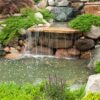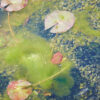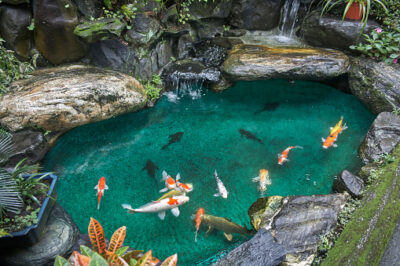Do you have a pond in your backyard? If so, then you know how important it is to keep the water clean. One of the best ways to do this is by filtering out debris and other pollutants from the water.
I’m sure you’ve heard of the idea that plants can filter water. But do you know what plant can filter water?
Plants are the unsung heroes of our planet. We rely so much on nature that it is almost impossible to imagine life without plants, even though we’re human beings and not plant people.
This blog post will go over different types of plants and their ability to filter water. Keep reading!
How Aquatic Plants Filter Water
Aquatic plants filter water by processing phosphates through their root system. Phosphates will be absorbed into the cells of aquatic plants where phytoplankton (algae) require it to create food.
The aquatic plant will use phosphates as a source of energy and release oxygen as a by-product of its photosynthetic metabolic process.
Aquatic plants filter water through their leaf structures and root system and will help to improve water clarity.
They absorb waterborne nutrients such as nitrates and phosphates, removing them from the water as they grow.
They also absorb chemicals such as ammonia which causes an unhealthy aquatic environment for fish and other aquatic lifeforms.
7 Effective Water Filter Plants
We will discuss seven aquatic plants that can filter water. Aquatic plants are beneficial in filtering the aquatic environment of their pollutants, and many aquatic life forms depend on aquatic plants for their survival.
Water Hyacinth (Eichhornia crassipes)
This aquatic flowering plant is native to tropical and subtropical regions worldwide, excluding Europe and Antarctica.
Water hyacinth is one of the fastest-growing plants on earth, with a growth rate of up to 1 metre per day during the summer months.
Because of this rapid growth rate, water hyacinth has quickly become an invasive species worldwide – choking waterways and affecting local ecosystems.
Water Hyacinths have been proven to remove 85% of total suspended solids and up to 88% of total coliforms from aquatic environments.
It can filter up to 90% of nitrates in aquatic environments when used as aquatic water filter plants and can filter out up to 50% of water pollutants that are chlorine-resistant.
This aquatic plant can grow extremely dense, making it difficult for aquatic life to pass through the aquatic environment where this aquatic water filter plant resides.
Water Hyacinth is an excellent example of an aquatic water filter plant due to its incredible aquatic growth rate and ability to absorb high levels of contaminants.
Anubias Nana Plant (Anubias barteri var. nana)
Also known as ‘Wild West aquatic plant’ is very effective for removing cadmium, copper, lead, nickel and zinc from aquatic environments.
This aquatic water filter plant is an aquatic plant native to India. It can remove high levels of toxins from aquatic systems due to its fast growth and biomass production.
Anubias Nana has broad leaves, which are great for filtering out debris in your pond. To do this, all you need to do is let the roots hang into the water, and it will naturally filter your water for you.
The downside to this plant is its slow growth rate, so be patient if you choose to grow these in your pond!
Water Lettuce (Pistia stratiotes)
Water lettuce has the aquatic ability to filter pollutants in aquatic environments and remove 50% of waterborne bacteria when used as aquatic water filter plants.
This aquatic plant is an aquatic freshwater root system that can release oxygen into the aquatic environment, beneficial for aquatic life during nighttime hours.
Watercress
Watercress is a lovely green plant that performs impressively when it comes to filtering water. It’s excellent at cleaning impurities in ponds and also makes a water garden attractive.
Watercress aquatic water filter plants have been shown to reduce pathogenic bacteria such as E. coli and Salmonella by 97% in aquatic water when used as aquatic water filter plants.
Azolla
There are many different types of plants that can filter water, but one of the most efficient is called an Azolla.
This type of aquatic plant has a very high rate of nitrogen fixation, so it will take in large quantities of nitrogen and release oxygen into the atmosphere while also removing some nitrates from your pond’s water.
It is also worth noting that this plant does not need sunlight or fertilizer like other plants do, which makes for a great option if you’re looking for something low maintenance!
Duckweed Floating Plant
Duckweed is a green, bright free-floating plant with an oval shape of 1/12 to 1/16 inches long. It has a single root that dives down below the water surface. Duckweed reproduces by fragmentation and budding and floats on water in large colonies.
Measuring 0.155cm to 0.315 cm, it’s one of the most miniature filtering plants. Still, it shows excellent results by spreading its canopy to reduce the light that fuels algae’s growth. Learn about how to get rid of algae in your pond naturally here.
It also absorbs harmful nitrates and other chemicals from water bodies, thereby improving water quality.
Water Lilies (Nymphaea spp.)
Water lilies are aquatic water filter plants that can grow under the weight of up to one ton per sq meter and can filter about 40 gallons of aquatic water per day.
They don’t only beautify ponds or garden pools, water lilies help to filter water by absorbing nutrients. They use the phosphates in ponds as a source of energy and release oxygen as a by-product of its photosynthetic metabolic process.
Conclusion
If you are looking for a more sustainable option to filter water, consider adding some aquatic plants. The best part is that they will also add texture and beauty to your outdoor space! You can find these at any pet store or nursery near you.
For the most effective plant varieties, talk with an expert like us who knows which ones work best in specific environments and climates based on what we’ve seen over our years of experience working with ponds. We would love to help make sure your water quality stays pristine all summer long!










